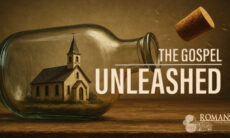Have you ever sat down for a test that you knew you weren’t ready for?
- Your stomach’s in knots, your pencil’s tapping the desk, and no matter how hard you rack your brain, the answers just won’t come.
- Now imagine this: you walk into class and the teacher says, “In order to pass, you need a perfect score — 100%. Even one tiny mistake and you fail.”
- It wouldn’t matter how smart you are, how hard you studied, or how well you did compared to the kid next to you. One wrong answer, and you’re done.
That’s the picture Paul paints in Romans 3. It’s not just about failing a school test — it’s about the biggest test of all: standing before a holy, perfect God.
No amount of trying, comparing, or pretending can get us to that 100% mark on our own.
That’s the kind of picture Paul paints in Romans 3.
- It’s not just about bad behavior—it’s about how every human being falls short of God’s perfect standard.
But the good news is that God doesn’t leave us in failure—He offers grace we could never earn.
I. Nobody Passes the Test
(Romans 3:10–18)
as it is written:
“None is righteous, no, not one;
11 no one understands;
no one seeks for God.
12 All have turned aside; together they have become worthless;
no one does good,
not even one.”
13 “Their throat is an open grave;
they use their tongues to deceive.”
“The venom of asps is under their lips.”
14 “Their mouth is full of curses and bitterness.”
15 “Their feet are swift to shed blood;
16 in their paths are ruin and misery,
17 and the way of peace they have not known.”
18 “There is no fear of God before their eyes.”
Here’s a breakdown of the quoted passages:
- Romans 3:10-12: Quotes from Psalm 14:1-3 (also found in Psalm 53).
- Romans 3:13: Quotes from Psalm 5:9 and Psalm 140:3.
- Romans 3:14: Quotes from Psalm 10:7.
- Romans 3:15-17: Quotes from Isaiah 59:7-8.
- Romans 3:18: Quotes from Psalm 36:1.
The point is that no one is “good enough” on their own—not even the best person you know.
- We tend to compare ourselves to others (e.g., “I’m not as bad as them”), but God compares us to His holiness.
- Like comparing yourself to an Olympic athlete—just because you can run faster than your friend doesn’t mean you qualify for the Olympics. God’s standard is perfection.
Instead of pretending to be perfect, be honest about your need for grace.
II. The Law Shows Our Sin, Not Our Strength
(Romans 3:19–20)
Now we know that whatever the law says it speaks to those who are under the law, so that every mouth may be stopped, and the whole world may be held accountable to God. 20 For by works of the law no human being[a] will be justified in his sight, since through the law comes knowledge of sin.
1. The Law silences self-justification.
The purpose of the Law is not to give people a means to boast, but to shut every mouth.
- We can’t stand before God with excuses, self-defense, or comparisons to others. The Law strips away every “But I…” argument.
2. The whole world is accountable.
Not just the Jews under the Mosaic Law, but everyone is guilty before God’s perfect standard.
- Sin is not just “bad choices” — it’s a universal problem. No one is naturally righteous enough to meet God’s standard.
3. Good deeds can’t justify anyone.
“By works of the law no human being will be justified…”
- We can’t earn salvation through religious rituals, good behavior, or moral checklists. It’s impossible. This verse kills self-salvation projects.
4. The Law reveals sin, but doesn’t remove it.
The Law’s function is diagnostic — it exposes sin and makes us aware of how far we fall short.
- Like an X-ray shows a broken bone but doesn’t fix it, the Law shows our guilt but points us to our need for a Savior.
5. The stage is set for something greater
- These verses pave the way for the glorious truth that follows in Romans 3:21-26 — righteousness comes apart from the Law, through faith in Jesus.
A mirror shows you when your face is dirty—but it can’t wash you. The law is the mirror.
We must see the bad news clearly so that the good news of the gospel shines brilliantly.
“When we see our sin through the mirror of God’s Law, it silences our excuses and pushes us to trust in Jesus — the only One who truly justifies.”
When we realize we can’t fix ourselves, we’re finally ready for grace.
III. But NOW
God Made a Way
(Romans 3:21–26)
But now the righteousness of God has been manifested apart from the law, although the Law and the Prophets bear witness to it— 22 the righteousness of God through faith in Jesus Christ for all who believe. For there is no distinction: 23 for all have sinned and fall short of the glory of God, 24 and are justified by his grace as a gift, through the redemption that is in Christ Jesus, 25 whom God put forward as a propitiation by his blood, to be received by faith. This was to show God’s righteousness, because in his divine forbearance he had passed over former sins. 26 It was to show his righteousness at the present time, so that he might be just and the justifier of the one who has faith in Jesus.
The two greatest words in Scripture might be: “But now.”
- God intervened. Jesus stepped in.
- You’re drowning, and someone jumps in and pulls you to safety. You didn’t earn it—you were rescued.
- Jesus lived the perfect life we couldn’t, died the death we deserved, and rose again to offer us life.
- Grace isn’t just for salvation; it’s how we live.
God’s plan has always been for all nations.
- This echoes OT promises to Abraham: “In you all the families of the earth shall be blessed” (Gen. 12:3).
- Paul is reminding the church in Rome — Jews and Gentiles together — that they stand on level ground.
IV. Boasting Is Cancelled
(Romans 3:27–31)
Then what becomes of our boasting? It is excluded. By what kind of law? By a law of works? No, but by the law of faith. 28 For we hold that one is justified by faith apart from works of the law. 29 Or is God the God of Jews only? Is he not the God of Gentiles also? Yes, of Gentiles also, 30 since God is one—who will justify the circumcised by faith and the uncircumcised through faith. 31 Do we then overthrow the law by this faith? By no means! On the contrary, we uphold the law.
1. “Law” means principle or rule here.
The “law of works” is the principle that says: “Do this and you’ll earn righteousness.”
- The “law of faith” is the principle that says: “Obey Christ’s call to repentance and receive righteousness as a gift.”
2. “The law of faith” rules out boasting.
- If salvation were by works, you’d have reason to brag: “Look what I did!”
- But faith acknowledges you can’t save yourself — you rely fully on what Christ has done.
- So it excludes boasting because you didn’t contribute to your righteousness.
3. Faith is the only way that honors both God’s holiness and His grace.
- Faith depends on the work of Christ, which satisfies the Law’s demands (Romans 3:25–26).
- It’s not an achievement but trust — this preserves God’s glory as the only Savior.
Imagine bragging about getting a free gift—it doesn’t make sense. You didn’t earn it.
Humility is the mark of someone who truly understands grace. Give credit to God, not yourself.
Treat others with the same grace God gives you—especially those who feel far from Him.
CONCLUSION:
“Your Story Isn’t Over”
- We all fall short.
- The law reveals our sin.
- Jesus made a way.
- Grace replaces pride with humility.
A broken car can’t fix itself—but in the hands of someone who knows what they’re doing, it can be restored. That’s what God does with us.
If you’ve been trying to earn your way to God or hiding your brokenness—bring it to Jesus. He already knows. He already paid. Grace wins.















